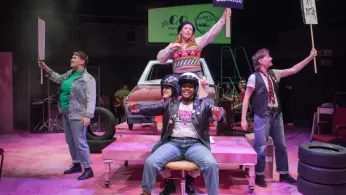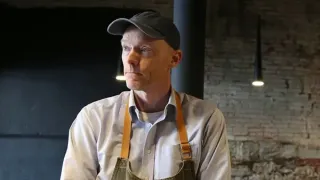
4 hours ago
"Gwenda’s Garage": London Musical Revives Story of Lesbian Empowerment in 1980s Sheffield
READ TIME: 2 MIN.
"Gwenda’s Garage: The Musical" opened to enthusiastic audiences at Southwark Playhouse Borough this autumn, running from October 30 to November 29, 2025. The show is set in Thatcher-era Sheffield—a period marked by industrial decline, political upheaval, and the rise of Section 28, which targeted LGBTQ+ communities. At its heart is the real-life Gwenda’s Garage, a pioneering lesbian-run car repair workshop that empowered women in South Yorkshire and challenged social norms .
Written by Nicky Hallett and featuring music and lyrics by Val Regan in collaboration with Hallett, the production draws directly from interviews with former garage members and feminist activists. The narrative follows three female mechanics who, defying workplace discrimination, establish their own business named after racing driver Gwenda Stewart. The garage becomes a hub not only for car repairs but also for resistance, friendship, and activism. The ensemble cast features Nancy Brabin Platt as Bev, Georgina Coram as Feona, Sia Kiwa as Terry, Lucy Mackay as Dipstick, Eva Scott as Carol, and Liz Kitchen in multiple roles, each bringing lived experience and emotional authenticity to the stage .
The playwrights and director Jelena Budimir have crafted a show that is as joyful as it is profound, balancing comedic moments with serious explorations of class, race, sexuality, parenthood, and education. The musical’s episodic structure captures four years of the women’s struggle and solidarity, as they confront everyday sexism, internalized homophobia, and the impact of Section 28—a law that prohibited the "promotion" of homosexuality by local authorities and in schools. Audiences witness the characters’ personal journeys, including Bev’s challenge to adopt as a lesbian and Feona’s gradual self-acceptance, set against the backdrop of working-class resistance .
As LGBTQ+ rights continue to face challenges worldwide, "Gwenda’s Garage" resonates powerfully with contemporary audiences. The show’s celebration of lesbian history, collective action, and intersectionality is especially poignant amid current debates around trans and queer rights in the UK and beyond . The production’s accessibility features—including captioned and BSL-interpreted performances—affirm its commitment to inclusivity for all audience members .
Critics have praised the musical’s energetic score, witty lyrics, and vibrant cast, noting its ability to uplift and inspire. While some reviewers found the episodic pacing less memorable, the overall consensus is one of empowerment and hope. The show’s documentation of a real lesbian-led business and its role in community organizing offers a rare and vital perspective on LGBTQ+ history, one that has too often gone unrecognized .
For many, "Gwenda’s Garage" is more than entertainment; it is a call to remembrance and action, showing how queer women have shaped their worlds despite adversity. The production’s affirming language and authentic representation of lesbian and transgender people reflect a broader commitment to inclusivity in the arts. By reviving the story of Gwenda’s Garage, the musical not only honors the women who defied discrimination in 1980s Sheffield but also inspires new generations to continue their fight for equality and dignity .






